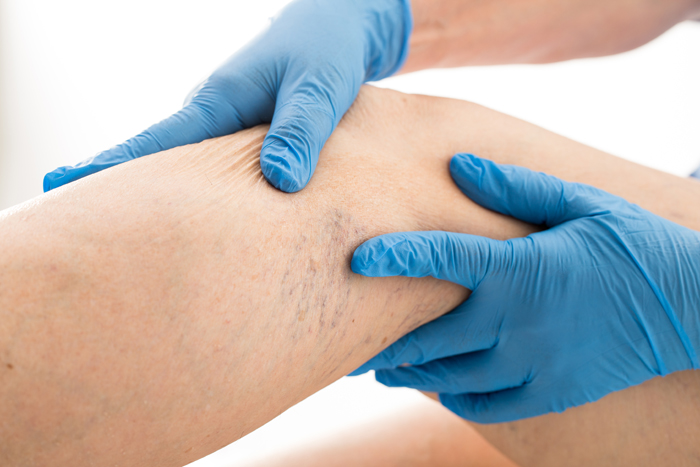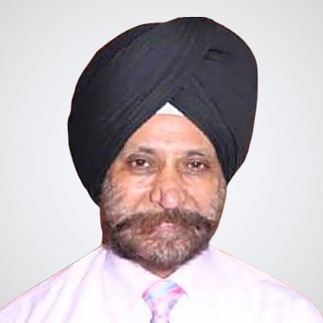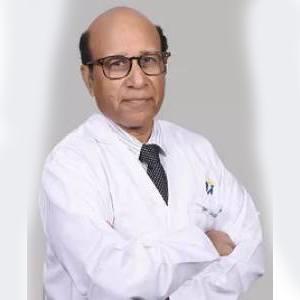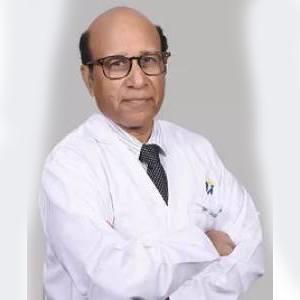Venous Insufficiency Treatment in Karol Bagh, Delhi
Introduction
Venous diseases are disorders caused due to damage in veins. Veins are thin, hollow blood vessels that carry deoxygenated blood from the rest of the body to the heart. Veins have flaps, called valves, that regulate the opening and closing of veins and ensure the unidirectional flow of blood. Venous diseases result in damage to the valves, causing leakage or bidirectional blood flow.
To seek treatment, you must consult the best vascular surgery hospital or vascular surgery specialist near you.

What are the different types of venous diseases?
- Varicose veins: Twisted, enlarged, swollen, and raised veins are called varicose veins. Varicose veins are also known as varicosities. This usually occurs in the legs and feet. They appear bluish-purple or reddish.
- Deep vein thrombosis: Deep vein thrombosis (DVT) is also known as a thromboembolism. It is a serious medical condition that occurs when blood clots form in the deep veins of the body. Blood clots are masses of blood cells formed because of blood coagulation.
- Pulmonary embolism: When blood clots from the vein can reach your lungs through the bloodstream and block the flow of blood. This is called pulmonary embolism. The blot clots usually occur in the deep veins of the thighs, pelvis and lower legs.
- Superficial venous thrombosis or phlebitis: In Superficial venous thrombosis a phlebitic blood clot develops in a vein closer to the skin surface.
What are the symptoms of venous diseases?
Signs and symptoms of venous diseases include:
- Pain in neck and shoulder.
- Swelling in the affected arm and hand.
- Sharp pain in the chest.
- Shortness of breath.
- Increase in heart rate.
- Swelling, pain and soreness in the vein.
- Discoloration, redness or bluishness in the leg.
- Warm feeling in the skin
- open sores.
- blood clots.
- varicose veins.
- high pressure in the veins.
- stretching and twisting of the veins.
- sluggish blood flow.
What are the causes of venous diseases?
- Any damage or injury to the walls of blood vessels can narrow or block the blood flow
- Damage of blood vessels during surgery
- Excessive bed rest after any surgery or because of a medical condition
- Physical inactivity, no mobility reduces blood flow in the legs leading to blood clot formation
- Some heavy medicines can also cause blood clots
- Fetus development causes pressure on the mother's legs and pelvis and that may lead to blood clot formation
- Inherited blood disorders
- Cancer, chances of formation of blot clots are higher in patients with late-stage colon, pancreatic and breast cancers
- People above 40 years are at a higher risk
- Obesity
- Smoking
- Varicose veins, enlarged veins that can cause DVT
- Heart diseases
When to see a doctor?
Immediately seek medical attention if you have constant pain and swelling in the veins of your arms and legs. You can request an appointment at
Apollo Spectra Hospitals, Karol Bagh, New Delhi.
Call 1860 500 2244 to book an appointment.
What are the complications associated with venous diseases?
- Pulmonary embolism (PE): it is the most common complication of DVT. PE is a life-threatening condition caused by blockage of blood flow in the lungs. PE demands timely and immediate medical attention
- Shortness of breath, blood in cough, fatigue and nausea
- Postphlebitic syndrome: It occurs when the vein is damaged due to blood clot formation leading to a reduction in blood flow and discoloration, pain and swelling in the affected area
What are the treatment options for venous diseases?
To treat venous disease both non-surgical as well as surgical treatments are available.
Non-surgical
- Anticoagulants and blood thinners to prevent blood clotting.
- Best rest and limb elevation
- Specially designed elastic support stockings to improve blood circulations.
Surgical
- Sclerotherapy: This is used to treat superficial varicose veins.it is an outpatient procedure. It involves injecting a solution directly into the affected vein to permanently close it and reroute the blood to the healthier vein.
- Laser therapy
- Surgical ligation and removal: It involves tying off and stripping the affected vein.
You can search online for a vascular surgeon in New Delhi or near you.
You can request an appointment at Apollo Spectra Hospitals, Karol Bagh, New Delhi.
Call 1860 500 2244 to book an appointment.
Conclusion
Venous diseases are common conditions that are majorly caused by faulty valves in the veins. Not all venous diseases are life-threatening but many are usually chronic. People should try to be more physically active to minimize the risk of developing such conditions.
References
https://www.hopkinsmedicine.org/health/conditions-and-diseases/venous-disease
Lose weight if you are obese and exercise daily. Avoid sitting or standing in the same position for a longer period.
Doctors are usually able to diagnose through symptoms only. Certain tests are done for confirmation that includes D-dimer test, ultrasound, venogram, scan tests like MRI and CT scan.
Your physician may refer you to a phlebologist or a vascular surgeon, or a dermatologist.
Symptoms
Our Doctors
DR. GULSHAN JIT SINGH
MBBS, MS (General Su...
| Experience | : | 49 Yeras Experience |
|---|---|---|
| Speciality | : | Vascular Surgery... | Location | : | Chirag Enclave |
| Timings | : | Tue, Fri: 2:00 PM to... |
DR. JAISOM CHOPRA
MBBS, MS, FRCS...
| Experience | : | 38 Yeras Experience |
|---|---|---|
| Speciality | : | Vascular Surgery... | Location | : | Chirag Enclave |
| Timings | : | Mon - Sat : 2:00 PM ... |
DR. JAISOM CHOPRA
MBBS, MS, FRCS...
| Experience | : | 38 Yeras Experience |
|---|---|---|
| Speciality | : | Vascular Surgery... | Location | : | Karol Bagh |
| Timings | : | Thur : On Call... |
Our Top Specialities
NOTICE BOARD
CONTACT US
CONTACT US
 Book Appointment
Book Appointment





.svg)
.svg)
.svg)
.svg)








